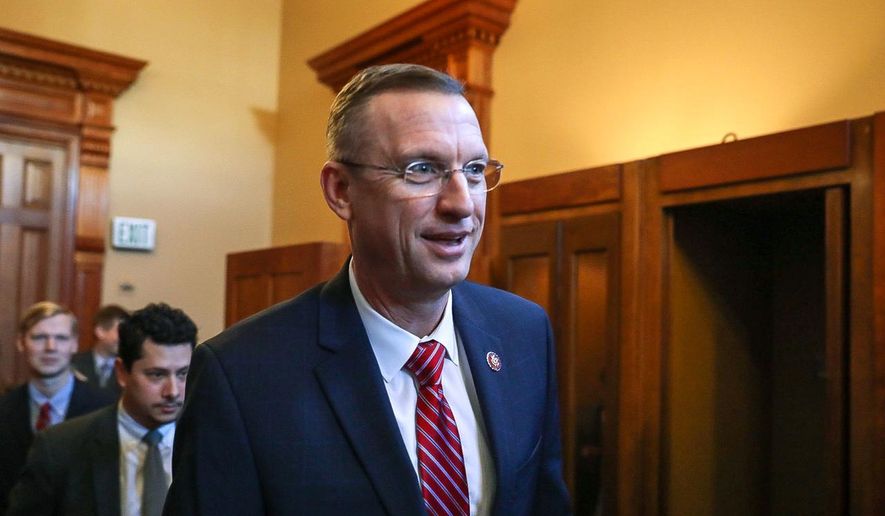ATLANTA (AP) - U.S. Rep. Doug Collins announced Wednesday that he’s running for the U.S. Senate seat held by a fellow Republican sworn in just weeks ago, potentially dividing the Georgia party while making allegiance to President Donald Trump even more of a key issue in this year’s campaigns.
“We’re ready for a good time down here to keep defending this president,” Collins said as he announced his Senate bid on “Fox & Friends.”
GOP Sen. Kelly Loeffler, a political newcomer and wealthy businesswoman, was appointed to fill the vacant seat by Gov. Brian Kemp, in part for her ability to appeal to a wider range of general election voters, particularly suburban women. Republicans still dominate Georgia politics, but Democrats have been gaining ground in recent elections.
Collins, 53, enters the race as one of Trump’s most vocal defenders in the House. He waved off concerns that he and Loeffler, 49, will tear each other apart and open the door for a Democrat to take the seat.
“That’s just wrong and we’re going to continue to make our case,” Collins told reporters in Washington. He said he spoke to Kemp before announcing his campaign, but didn’t answer when asked whether he had spoken with Trump.
Collins was Trump’s pick for the seat, but Kemp went with Loeffler instead to replace the recently retired Republican Sen. Johnny Isakson.
Trump allies expect Collins to use Fox News appearances and private entreaties to try to convince Trump to back him in the primary - or at least stay neutral. Trump has not publicly weighed in. In the past, Trump has waded into competitive GOP primaries when he feared the party might lose the seat.
Kemp has promised to fight for Loeffler during her debut campaign. Her other allies include the U.S. Chamber of Commerce and the National Republican Senatorial Committee, which issued a statement lambasting Collins’ “shortsightedness” and “selfishness.”
The committee’s statement said Collins would endanger the Republicans’ ability to carry Georgia for Trump and reelect GOP U.S. Sen David Perdue. Those races will share the Nov. 3 ballot with the special election to fill the last two years of Isakson’s term.
“All he has done is put two Senate seats, multiple House seats, and Georgia’s 16 electoral votes in play,” NRSC Executive Director Kevin McLaughlin said in the statement.
Isakson’s retirement from the Senate at the end of December set up a political scramble for his seat. Collins openly lobbied for the appointment, with support from Trump. Kemp’s choice of Loeffler to serve until a November special election outraged Trump loyalists, who perceived it as defiance of the president.
The decision by the four-term lawmaker could complicate the GOP’s chances of holding onto the seat as Republicans battle to retain their Senate majority in November’s elections.
Though still not well known to many Georgia voters, Loeffler has pledged to spend $20 million of her own money on the campaign. She’s already airing TV and online ads that play up her support for Trump and emphasize her roots growing up on a farm.
“I’ve only been in Washington a few weeks, and it’s even worse than you thought,” Loeffler says in an ad that launched hours before Collins’ announcement.
Meanwhile, Kemp is working to bolster support for his Senate appointee. Speaking Wednesday to a lunch hosted by the Faith and Freedom Coalition, Kemp compared Loeffler to “political outsider” businessmen-turned-politicians like Trump and Perdue.
“She’s unapologetically pro-life, she supports our president and she supports a great business environment,” Kemp told the group. Asked by a reporter about Collins as he left the event, Kemp kept walking and did not answer.
Without opposition from fellow Republicans, Loeffler would have been able to focus more on issues such as the economy and health care to win over independents and moderates “who make up the margin of victory in Georgia,” said Brian Robinson, a Republican political adviser who served as communications director under former Georgia Gov. Nathan Deal.
“It is a seismic difference in strategy calculations now” that Collins is in the race, Robinson said. “You’re going to see them fighting it out on more Trumpy issues, more cultural issues - guns and abortion and the wall.”
Collins is a lawyer and a U.S. Air Force Reserve chaplain who deployed to Iraq in 2008 while serving in the state legislature. He won election to Congress in 2012 in Georgia’s 9th District, a heavily conservative seat that spans the state’s northeastern corner.
While he has generally gotten along with lawmakers on both sides, Collins has become more confrontational in recent years, emerging as one of Trump’s chief defenders as the top Republican on the House Judiciary Committee.
Under current Georgia law, the Nov. 3 special election will be a free-for-all, pitting Loeffler against all challengers, both Republicans and Democrats. If no one wins a majority, a runoff would be held in January.
But a proposal moving through the state legislature would add party primaries, like those held in normally scheduled elections, to choose a single Republican and Democratic nominee ahead of November. A House committee Tuesday approved the measure, which has support from House Speaker David Ralston, a Collins ally.
Kemp has threatened to veto the election change if it’s adopted.
A head-to-head GOP primary with Loeffler could give an advantage to Collins, who has wide support among conservatives. Primary contests also appeal to many Democrats, who see a one-on-one race with Loeffler or Collins in November as their best chance of winning.
Democrats Ed Tarver, a former federal prosecutor in Georgia under President Barack Obama, and Matt Lieberman, the son of former senator and vice presidential candidate Joe Lieberman, are running. The Rev. Raphael Warnock, pastor of the Atlanta church where Martin Luther King Jr. once preached, is also said to be considering a bid.
___
AP writers Alan Fram and Zeke Miller in Washington contributed to this story.




Please read our comment policy before commenting.